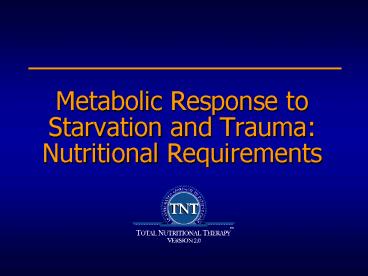Metabolic Response to Starvation and Trauma: Nutritional Requirements - PowerPoint PPT Presentation
1 / 26
Title:
Metabolic Response to Starvation and Trauma: Nutritional Requirements
Description:
Explain the differences between metabolic responses to starvation and trauma ... Enteral and Tube Feeding. 3rd ed. 1997. Metabolic Response to Trauma. Fatty Deposits ... – PowerPoint PPT presentation
Number of Views:3193
Avg rating:3.0/5.0
Title: Metabolic Response to Starvation and Trauma: Nutritional Requirements
1
Metabolic Response to Starvation and
TraumaNutritional Requirements
2
Objectives
- Explain the differences between metabolic
responses to starvation and trauma - Explain the effect of trauma on metabolic rate
and substrate utilization - Determine calorie and protein requirements during
metabolic stress
3
Metabolic Response to Fasting
4
Fasting Early Stage
Fat
5
Fasting Late Stage
6
Metabolic Reaction to Starvation
Landberg L, et al. N Engl J Med 19782981295.
7
Energy Expenditure in Starvation
Long CL et al. JPEN 19793452-456
8
Metabolic Response to Trauma
Cutherbertson DP, et al. Adv Clin Chem
1969121-55
9
Metabolic Response to TraumaEbb Phase
- Characterized by hypovolemic shock
- Priority is to maintain life/homeostasis
- ? Cardiac output
- ? Oxygen consumption
- ? Blood pressure
- ? Tissue perfusion
- ? Body temperature
- ? Metabolic rate
Cuthbertson DP, et al. Adv Clin Chem
1969121-55Welborn MB. In Rombeau JL,
Rolandelli RH, eds. Enteral and Tube Feeding. 3rd
ed. 1997
10
Metabolic Response to TraumaFlow Phase
- ? Catecholamines
- ? Glucocorticoids
- ? Glucagon
- Release of cytokines, lipid mediators
- Acute phase protein production
Cuthbertson DP, et al. Adv Clin Chem
1969121-55Welborn MB. In Rombeau JL,
Rolandelli RH, eds. Enteral and Tube Feeding. 3rd
ed. 1997
11
Metabolic Response to Trauma
Fatty Acids Glucose Amino Acids
Fatty Deposits Liver Muscle (glycogen) Muscle
(amino acids)
Endocrine Response
12
Metabolic Response to Trauma
28 24 20 16 12 8 4 0
Nitrogen Excretion (g/day)
10 20 30 40
Days
Long CL, et al. JPEN 19793452-456
13
Severity of Trauma Effects on Nitrogen Losses
and Metabolic Rate
Adapted from Long CL, et al. JPEN 19793452-456
14
Metabolic Response to Starvation and Trauma
The body adapts to starvation, but not in the
presence of critical injury or disease.
Popp MB, et al. In Fischer JF, ed. Surgical
Nutrition. 1983.
15
Metabolic Response to Surgical Trauma
Metabolic Changes after Trauma
16
Determining Calorie Requirements
- Indirect calorimetry
- Harris-Benedict x stress factor x activity factor
- 25-30 kcal/kg body weight/day
17
Metabolic Response to Starvation and Trauma
Nutritional Requirements
Example Energy requirements for patient with
cancer in bed BEE x 1.10 x 1.2
ADA Manual Of Clinical Dietetics. 5th ed.
Chicago American Dietetic Association 1996 Long
CL, et al. JPEN 19793452-456
18
Metabolic Response to Overfeeding
- Hyperglycemia
- Hypertriglyceridemia
- Hypercapnia
- Fatty liver
- Hypophosphatemia, hypomagnesemia, hypokalemia
Barton RG. Nutr Clin Pract 19949127-139
19
Macronutrients during Stress
- Carbohydrate
- At least 100 g/day needed to prevent ketosis
- Carbohydrate intake during stress should be
between 30-40 of total calories - Glucose intake should not exceed5 mg/kg/min
Barton RG. Nutr Clin Pract 19949127-139 ASPEN
Board of Directors. JPEN 2002 26 Suppl 122SA
20
Macronutrientes during Stress
- Fat
- Provide 20-35 of total calories
- Maximum recommendation for intravenous lipid
infusion 1.0 -1.5 g/kg/day - Monitor triglyceride level to ensure adequate
lipid clearance
Barton RG. Nutr Clin Pract 19949127-139 ASPEN
Board of Directors. JPEN 200226 Suppl 122SA
21
Macronutrients during Stress
- Protein
- Requirements range from 1.2-2.0 g/kg/day during
stress - Comprise 20-30 of total calories during stress
Barton RG. Nutr Clin Pract 19949127-139 ASPEN
Board of Directors. JPEN 200226 Suppl 122SA
22
Determining Protein Requirements for Hospitalized
Patients
No Stress
Moderate Stress
Severe Stress
Stress Level CalorieNitrogen Ratio Percent
Potein / Total Calories Protein / kg Body Weight
gt 1501
150-1001
lt 1001
lt 15 protein
15-20 protein
gt 20 protein
0.8 g/kg/day
1.0-1.2 g/kg/day
1.5-2.0 g/kg/day
23
Role of Glutamine in Metabolic Stress
- Considered conditionally essential for critical
patients - Depleted after trauma
- Provides fuel for the cells of the immune system
and GI tract - Helps maintain or restore intestinal mucosal
integrity
Smith RJ, et al. JPEN 199014(4 Suppl)94S-99S
Pastores SM, et al. Nutrition 199410385-391Cal
der PC. Clin Nutr 1994132-8 Furst P. Eur J
Clin Nutr 199448607-616 Standen J, Bihari D.
Curr Opin Clin Nutr Metab Care 20003149-157
24
Role of Arginine in Metabolic Stress
- Provides substrates to immune system
- Increases nitrogen retention after metabolic
stress - Improves wound healing in animal models
- Stimulates secretion of growth hormone and is a
precursor for polyamines and nitric oxide - Not appropriate for septic or inflammatory
patients.
Giving arginine to a septic patient is like
putting gasoline on an already burning fire. -
B. Mizock, Medical Intensive Care Unit, Cook
County Hospital, Chicago, IL
Barbul A. JPEN 198610227-238 Barbul A, et al.
J Surg Res 198029228-235
25
Key Vitamins and Minerals
26
Summary
- Metabolic response to starvation is an adaptive
mechanism - Nutritional requirements increase during trauma































